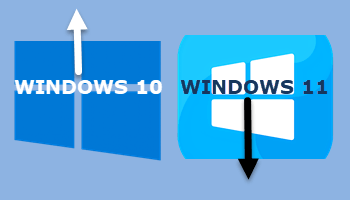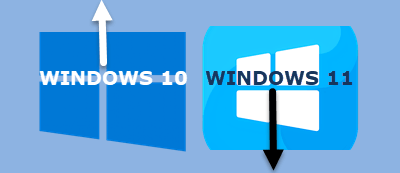I’ve just read an article from a well-known tech site declaring that Windows 11‘s market share is dropping while Windows 10 is gaining market share. An assertion that was based solely on the fact that, during the past month, StatCounter’s desktop operating system market share statistics showed a swing away from Windows 11 in favor of Windows 10.
The mistake that the tech site made is relying on StatCounter’s statistics to come to that conclusion. StatCounter is a site that analyses market share based on information derived from visitors across 3 million monitored sites. However, the statistics gathered by StatCounter are notoriously skewed, and that well-known tech site should know better. Allow me to explain.
Why StatCounter’s Numbers Are Not Accurate
Part of StatCounter’s methodology is to count all visits, rather than only unique visits. This means that, if the same user visits one or more of the monitored sites multiple times during any given period, each of those visits is counted.
For example, if the same user visits one or more of the monitored sites (say) 12 times during any given period using the Edge browser from within Windows 10, StatCounter is increasing both Edge and Windows 10 usage by 12 when, in reality, those numbers should be only be increased by 1 – equaling a single user.
This flaw in StatCounter’s methodology is what, at times, produces seemingly unusual fluctuations in its market share statistics. The only way to accurately measure market share is to count unique visits only. NetMarketShare, which used to provide a similar service, only counted unique visits and, as such, was the trusted source for these types of statistics- over and above StatCounter.
Unfortunately, NetMarketShare’s service is now defunct and, with StatCounter being the sole alternative, everyone is now relying on StatCounter’s service for market share statistics.
Don’t get me wrong, I’m not saying that StatCounter’s statistics should be discounted altogether, they still provide a ballpark guide. What I am saying is that StatCounter’s statistics are simply not accurate enough to define these types of trends.
Is Windows 11 Losing Ground To Windows 10?
I seriously doubt it. It is possible that some users might be downgrading from Windows 11 to Windows 10. However, in my humble opinion, it is far more likely that StatCounter’s flawed methodology is responsible for producing misleading statistics.
By all means, use StatCounter’s market share statistics as a guide but because of the flawed methodology often resulting in unusual fluctuations, one should not read too much into them – and the tech sites that do read too much into them should know better.
Then again, as far as tech site journalism goes these days, sensational headlines trump accuracy all day.
—



Well Jim , you may very well be correct that NetMarketShare stats may be skewered but the fact is that Windows 11 market share is nowhere where it should be , it is undeniably lower than Windows 10 when at this point in time it should be very close to, on par with or higher than Windows 10 .
We are less than 10 months away from Windows 10 end of life and a market share of 35 to 40% at this point in time simply just not cut it for the OS.
I have known some that have bought brand new PC’s with Windows 11 preinstalled just to downgrade them to Windows 10 THAT’S how disappointed some are with this OS. Windows 11 started as nothing more than a tablet OS that didn’t do very well at all but Microsoft was unwilling to take a loss on it so they decided to convert it to a PC OS and it STILL isn’t doing very well , yet Microsoft keeps trying to cram it down everyone’s throat and the truth is , most of us are not having it.
Most , if not all Windows 10 users that I know are going to keep using the OS beyond end of life , despite all the Microsoft scaremongering … because that is pretty much all it is.
Not NetMarketShare Ed, their stats were always trusted. It’s StatCounter’s stats that are skewed.
Agreed, Windows 11’s uptake has been slow. That’s partly because the OS has not proved to be popular but also because MS’s ridiculous requirements eliminated millions of Windows 10 PCs from the upgrade path.
Mate, you’ll get no argument from me., I agree with everything you’ve said.
“Agreed, Windows 11’s uptake has been slow. That’s partly because the OS has not proved to be popular but also because MS’s ridiculous requirements eliminated millions of Windows 10 PCs from the upgrade path.”
Thanks for the reply and exactly my point Jim, there isn’t a person at Microsoft that convince me they are doing this for security reasons, especially when so many “unsupported” PC’s can run the OS just fine.
Personally to me , it is nothing but a money grab by a conglomerate looking for kickbacks from all these hardware manufacturers .
Most Windows 10 systems already have TPM and secure boot preinstalled , so what this is REALLY about is kickback money from the CPU manufacturers .
Windows 11 is no more secure than Windows 10 with TPM and Secure Boot enabled. But obviously they have millions drinking the Microsoft kool aide.
Despite what everyone thinks , there is no boogey man hanging out just outside your router , it’s a falsity. The plain truth is if you visit nasty places on the web , nasty things happen. I have some friends that still use Windows XP as a novelty OS and connect their systems to the web and are YET to have anything bad happen.
This statement “Microsoft keeps trying to cram it down everyone’s throat” is definitely the best way to act if you want to start a rebellion!!! How many times have I (as a child) witnessed elders try to get kids to do something with that method only to see kids take a stand and oppose.
I have two very old desktop computers which I will keep using with Windows 10, just to see what happens. Hopefully my protection software will keep on working so only time will tell,. Microsoft needs to meet their Waterloo, Mindblower!
Hi, Jim! People so adamantly resistant to upgrading to Windows 11 are like old geezers who refuse to give up their mule and plow, even though a gas powered tractor would be an improvement. Granted, Win 11 is not as large an improvement as that over Win 10, but it IS an improvement, particularly in terms of security. Win 11 has significantly greater security built in. There was a similar “resist” sentiment when Win 10 was introduced. But, nearly everyone eventually got on board, and those who did grew to love the Win 10 product. Windows 11 feels a little different. Not a lot different, but, yes, a little. However, like every version of Windows before it, there are a number of apps available to give you back some of the user interface settings you become so accustomed to after so many years of living with the Win 10 interface. Personally, I like a little change now and then, as long as it feels like progress. For the first few days, it didn’t. Eventually, however, I have become used to the fairly minor (to me, at least) changes in the Win 11 interface. On the plus side, I feel like Win 11 is more configurable, as the settings options give you a lot of options in a lot of places that were not easily accessible in Win 10. You may have to dig a little deeper to get to them, but it’s worth the journey.
To those desperately clinging to your Windows 10 in fear that your whole world will fall apart and you will spiral endlessly into the abyss of Windows hell if you make the upgrade, I’m here to calm your fears. I see no perceptible difference in performance and the feel of the OS is not different. It’s nothing like the disaster that going from Win 7 to Win 8 was (Ugh!). No. I like Window 11. I wasn’t entirely sure, at first. But, having lived with it for a few weeks on a new Asus 17″ Vivobook laptop, I wouldn’t go back to Win 10. I have even upgraded my desktop to Win 11. It feels like the next step to something bigger. I’m not afraid. I’ll soon be entering my 7th decade on planet Earth. If I’m not moving forward, I am, essentially, moving backwards. Get with it, you conservative OS pansies. If an old man like me can learn to like it so quickly, I’m sure you can, too. 🙂
Hey Daniel,
I do agree with you to a certain extent. It’s a fact of life that resistance to change is a common human trait.
Bear in mind too that, because of MS’s stringent Windows 11 requirements, there are millions of users who, through no fault of their own, are being denied the opportunity to upgrade perfectly capable Windows 10 PCs to Windows 11.
Cheers… Jim
This exactly.
My computer is old and I cannot afford to replace it right now. Windows 11 wouldn’t work on it.
I always felt the timing was bad for Windows 11. We’d had the pandemic and a lot of people where struggling financially and MS decided to release an OS that wouldn’t run on some decent modern equipment
Believe we overlooked two alternatives. The first is to use a cell (yes different o/s) for all your Internet needs. Know of several people who have a desktop (currently on Windows 10) who only touch it when they need to print a document. All other Internet usages is via that tiny device. Personally, this not not something I would consider, but this is an option to by-pass MS. The other, something my wife enjoys doing is using a tablet. Again totally different o/s.
This does not solve the problem is one doers not own or have access to one.
Now we are talking costs to replace older computers. Marc mentioned how pleased he was with his tiny pc and I most certainly would consider getting one if forced. Cost wise they are less than $500 (CDN), from Amazon. Some food for thought, Mindblower!